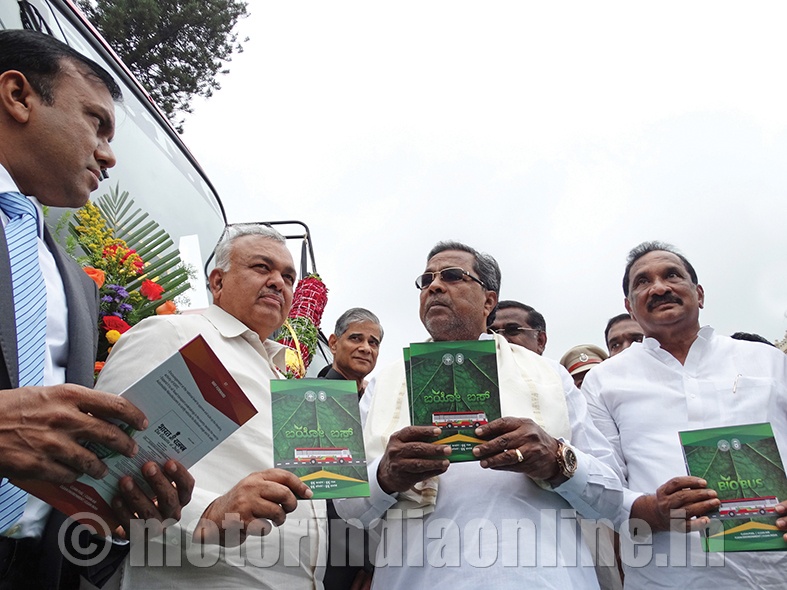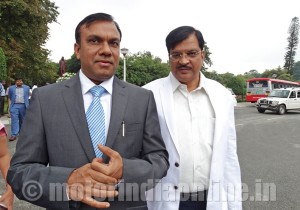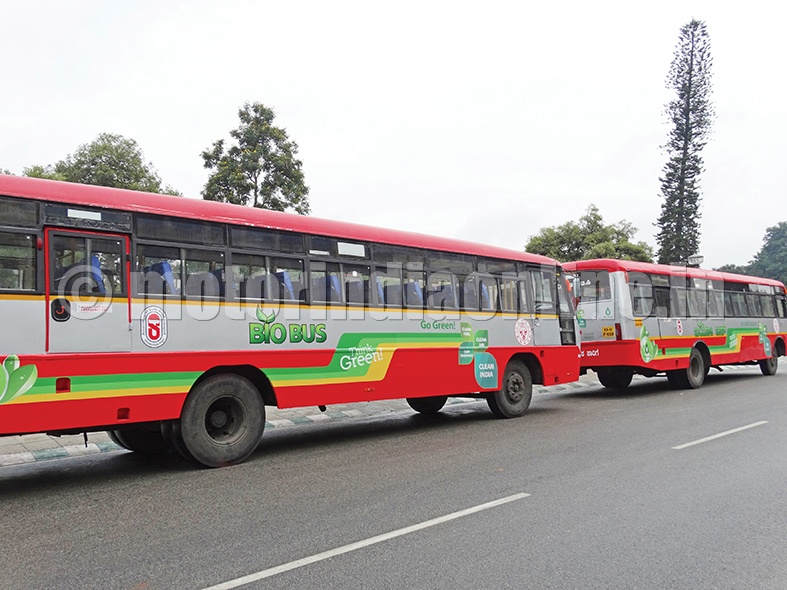Driver Bharat and conductor Sanga Shetty drove down nearly 250 km to Somvarapet in Coorg district on the morning of October 2 – birth anniversaries of Mahatma Gandhi and former Prime Minister Lal Bahadur Shastri. The day was very special to them as they were assigned to one of the 10 KSRTC buses marked to run on bio-diesel fuel. They were indeed excited to be at the Vidhana Soudha awaiting the arrival of the Karnataka Chief Minister, Mr. Siddaramaiah, the Home Minister, Mr. K.J. George, the Transport Minister, Mr. R. Ramalinga Reddy, and the KSRTC Managing Director, Mr. Rajender Kumar Kataria, for the inauguration of the first stage of KSRTC’s bio-diesel initiative.
Inaugurating the event by releasing white and green balloons and launching a brochure on the occasion, Mr. Kataria said: “On August 10, 2015, the Government of India issued a notification to allow the sale and distribution of bio-diesel. And BIS specifications have also come in. So in this pilot phase we are running 10 buses on 10 different routes for a month using a combination of bio-diesel and regular diesel in the ratio of 20:80. We will also monitor the progress against a few parameters like fuel efficiency. We shall perform regular checks on these vehicles to follow the impact of the fuel. Then we will also record feedback from the drivers on a daily basis. We have set up a dedicated team to explore the data received.”
Of the 10 buses, five each are of Tata and Ashok Leyland make. Mr. Kataria shares: “The average vehicle utilization per day is around 450 km. The engine is running for almost 8-10 hours, so we will have the optimum results.”
The average age of these buses would be between two and four years of age and would have travelled an average distance of two to four lakh km.
Three stages
The initiative is divided into three stages. Following the first stage in a month’s time, the second stage involves taking over a depot and running more than 100 buses on this fuel. The third stage would commence in a couple of months time after that when the findings from the first two stages would be analysed. Said Mr. Kataria: “We will go for a three-month trial after the second stage. If the data is encouraging then we will expand it to our entire fleet of almost 8,400 buses. We believe that when the same person drives the same vehicle on the same route we will know how different the vehicle will behave using this combo fuel.”
The choice of routes takes into account all terrains, whether forest, ghat roads or coastal where the moisture content would be high. These buses will travel on national and state highways and on major district roads besides village roads.
Why bio-diesel?
Bio-diesel is a clean burning renewable fuel made by using vegetable oil, used cooking oil and animal fat. Chemical processing converts these oils into fatty acid methyl esters (FAME) which can then be blended with petro diesel without making any changes to the existing engines. Apart from this, bio-diesel is biodegradable, non-toxi and has high flash point. It is safer to handle and easier to store as against regular diesel. With lower exhaust emissions, bio-diesel improves quality of air and in turn the health of people.
Internal planning regarding bio-diesel as fuel has been underway for the last three months at KSRTC. The studies on emission levels of different chemical components, international emission standards and comparisons between petro diesel and bio-diesel have helped KSRTC to decide to go ahead with the initiative. Mr. Kataria shares, “it is in direct alignment with the Swachch Bharat mission.” The expected emission reduction by replacing fossil fuel with 20 per cent of bio-diesel (B20) will be significant. (See Box – Emission Reduction using B20)
ASRTU has zeroed in on one manufacturer of bio-fuel who will be supplying for five rupees per litre less than the cost of diesel at any point in time, even in the face of fluctuating prices.
ASRTU has its work cut out as an advisor to STUs to try alternate organic fuel for a healthier eco-system. If some STUs are free to procure the bio-diesel from a supplier of their choice, others like KSRTC have to go via the government tendering process.
Knowledge Bank
KSRTC has roped in prestigious academic institutes like IISC – Bangalore, R V College of Engineering and JSS College of Technology to help conduct the study. Besides, the Association of State Road Transport Undertakings (ASRTU), which celebrated its golden jubilee in August, is also partnering KSRTC in this initiative.

Mr. P.S. Ananda Rao, Executive Director, ASRTU, says, “on behalf of the Central Government we are driving this renewable energy program all over India.”
Mr. Kataria adds: “ASRTU will help us conduct a proper research so that the results will be shared with all the STUs and the notification issued by the Government of India specifically says that even railways also can use it apart from bulk consumers. It is important to note that no one has any ground level experience as of now.”
Recycle & save
KSRTC finds double benefit in using bio-diesel – one, the raw material which is rejected cooking oil and vegetable oil supporting the concept of ‘Waste to Energy’, and second, it will save forex expenditure.
Mr. Kataria shares: “Our social contribution would be to reduce emissions. Cost-wise, I buy diesel worth Rs. 120 crores every month. With B20, KSRTC will save more than Rs. 20 crores.”
Since switching over from conventional diesel to bio-diesel is a huge step, KSRTC has decided to exercise strict vehicle maintenance protocol.

He explains: “For us, 30 per cent of overall cost is that of maintenance which is avoidable. Our maintenance protocol will include changing oil, filter and tyres after every few kilomters. Then we are working towards instilling a sense of ownership in our drivers and make them feel that they are the real contributors to the welfare of the society.”
With an annual consumption of 211,320 kilolitres of diesel, KSRTC’s effort at making environment clean and green makes sense.
Electromobility & hybrid transport
The Union Minister for Surface Transport, Highways and Shipping, Mr. Nitin Gadkari, is fully prepared to give a push to running mass transportation using electromobility and hybrid apart from bio-fuel. But electromobility is expensive and has limitations making bio-diesel the probable option as of now for KSRTC.
Mr. Kataria says: “In India, we do not have the technology and supplier in place yet. If the ordinary bus which I run in the villages costs me around Rs. 20 lakh, this bus will cost me Rs. 2 crores. Besides, transport running on electromobility cannot cover long distances because after every 30-40 km the buses will need to recharge. Hence they will need relevant infrastructure. In cities it is still possible. The Central Government is also coming out with hybrid-electro-mobility transport. I have requested for 50 such buses, so that I can run them on a trial in Mysore city to add to its historical glamour.”
Training
While no special training is as such required for the drivers to run bio buses, KSRTC is preparing them to become more proactive, dynamic and motivated with the help of ASRTU.
Mr. Kataria shares: “We will give our people training in storage and blending of the bio-diesel. They will learn how to use it, handling it safe, security parameters, how to monitor the vehicle’s KMPL and fuel efficiency every day.”
Mr. Rao adds: “ASRTU will take up training of drivers in a big way. We will promote not only this activity but on behalf of the government we are promoting electric, hybrid and renewable fuel and soon we are going to take up 10 cities in India.”
With careful monitoring of everyday performance in the first month, then scaling up the same to enable the establishment to embrace the fleet running in the whole of Karnataka, KSRTC has just begun its green journey.
